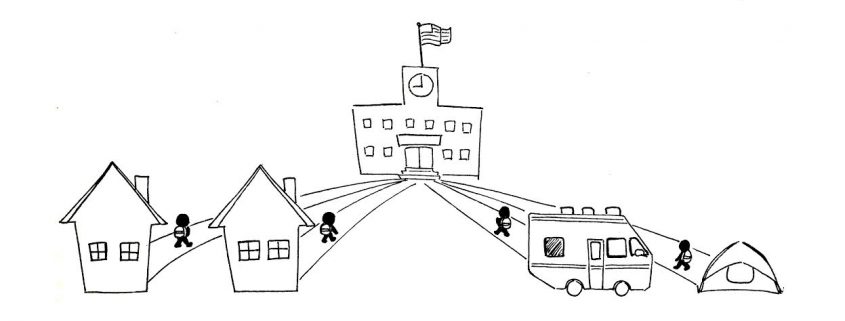COLUMN: USC must acknowledge homelessness
In the dead of night two weeks ago, thousands of volunteers, including USC students and faculty, hit the streets of Los Angeles for the Homeless Count, an annual service event. Based on last year’s census, on any given night, over 80,000 Angelenos sleep on the streets. That’s nearly twice USC’s total undergraduate and graduate population. But the problem is a lot more personal than a simple statistic. It’s personal when you see tents lined up underneath the nearby underpass, when someone on Figueroa Street begs you for some change or some food. It’s also an issue that affects many students, such as the 13 percent of community college students who are homeless. The rising costs of tuition and housing force them to live out of cars or friend’s apartments.
We all have defining experiences with homeless individuals that shape our perception of some of the most marginalized people in our society. For me, though I’ve been heckled and had food thrown at me, I’ve also received some of life’s best advice from someone in a shelter and have met some of the most resilient, creative, hopeful and inspiring people on the streets. We cannot limit our experiences with homeless people to hurried glances or pitiful expressions — otherwise we run the risk of succumbing to the notion that some people are too far gone to save.
Sometimes it takes a donation to save a life, but sometimes it only takes a smile to brighten one. To even begin eradicating the plague of homelessness, we need to first expand our capacity to empathize with those that we fear and don’t understand. It’s easy to walk by the huddled masses on the corner. It’s easy to look away and move on. But it’s hard to overcome apathy. It’s hard to overcome stigma. Yet inaction can no longer be our course of action.
Los Angeles as a city has begun to rise to the challenge. Ballot Measure HHH last November secured $1 billion to invest in housing for the homeless, and Measure H on March 7 seeks to allocate sales tax revenue to services that rehabilitate the homeless.
But as students and citizens, we have a role to play as well. On Feb. 27, Homelessness Awareness Week at USC, hosted by USC’s newly formed Homelessness Action Committee, will provide opportunities to gain knowledge on how to join the cause. The student organization Share a Meal hits the streets twice a week to serve burritos to the homeless people in our backyard. And the University itself this past year unveiled a multi-pronged initiative to tackle homelessness through professional schools such as the USC Dworak-Peck School of Social Work and with community partners and the city itself.
But this is only where our activism begins, not ends. Even if we lack the time and means to volunteer with a local nonprofit or advocate for the passing of Measure H, we can still work to humanize homelessness on a personal level and on a daily basis. By offering to buy food for those who call Figueroa street home or by taking a minute to engage in a simple conversation with someone on the street, we validate the humanity of those whom we are prone to ignore and forget. By having the conviction to challenge the apathy and stigma we encounter within ourselves or in others, we can begin to change the dominating, pessimistic narrative surrounding homelessness. Ultimately, the first step in addressing a problem isn’t seeing that a problem exists, but rather realizing that real humans suffer from it.
Homelessness is often seen as some inextricable problem with so many causes and failed solutions that it seems inevitable that some Americans will line the streets every night. But it’s neither necessary nor normal for human beings not to have a place to call home. It’s neither moral nor acceptable for our most marginalized population to be left behind as we walk by their sleeping bags and tents.
But it’s not too late to change course. These people may be homeless, but they are far from hopeless. We students directly may not have created the problem, but we each must play a part in ending it.
Alec Vandenberg is a freshman majoring in public policy. His column,“Civil and Civic,” runs every other Monday.

